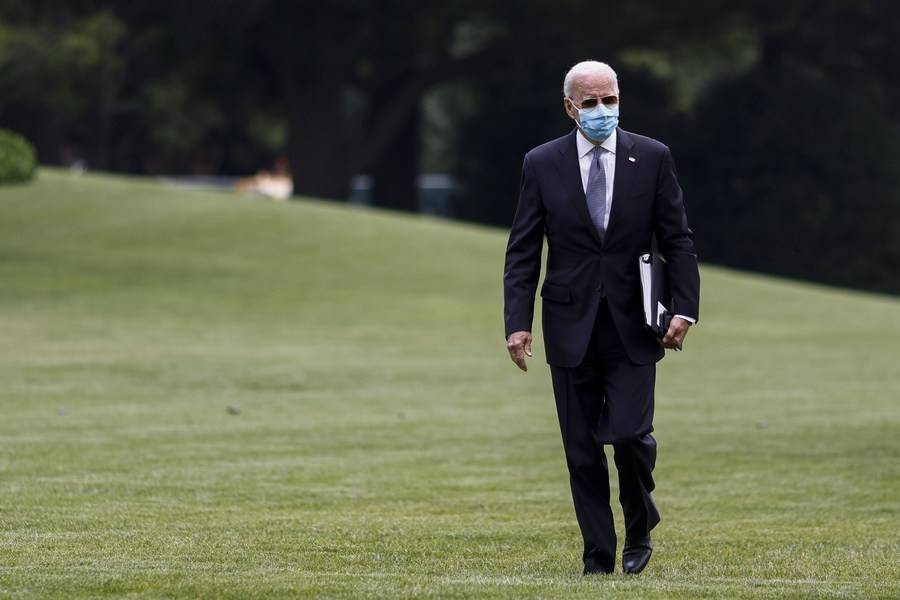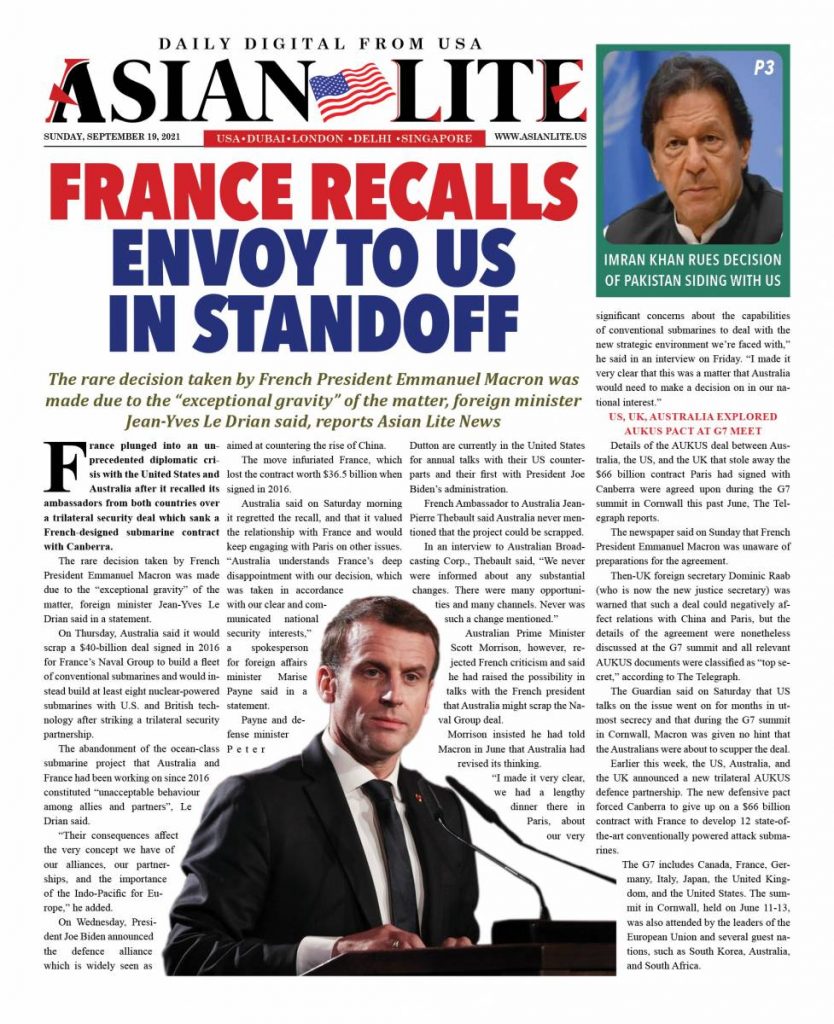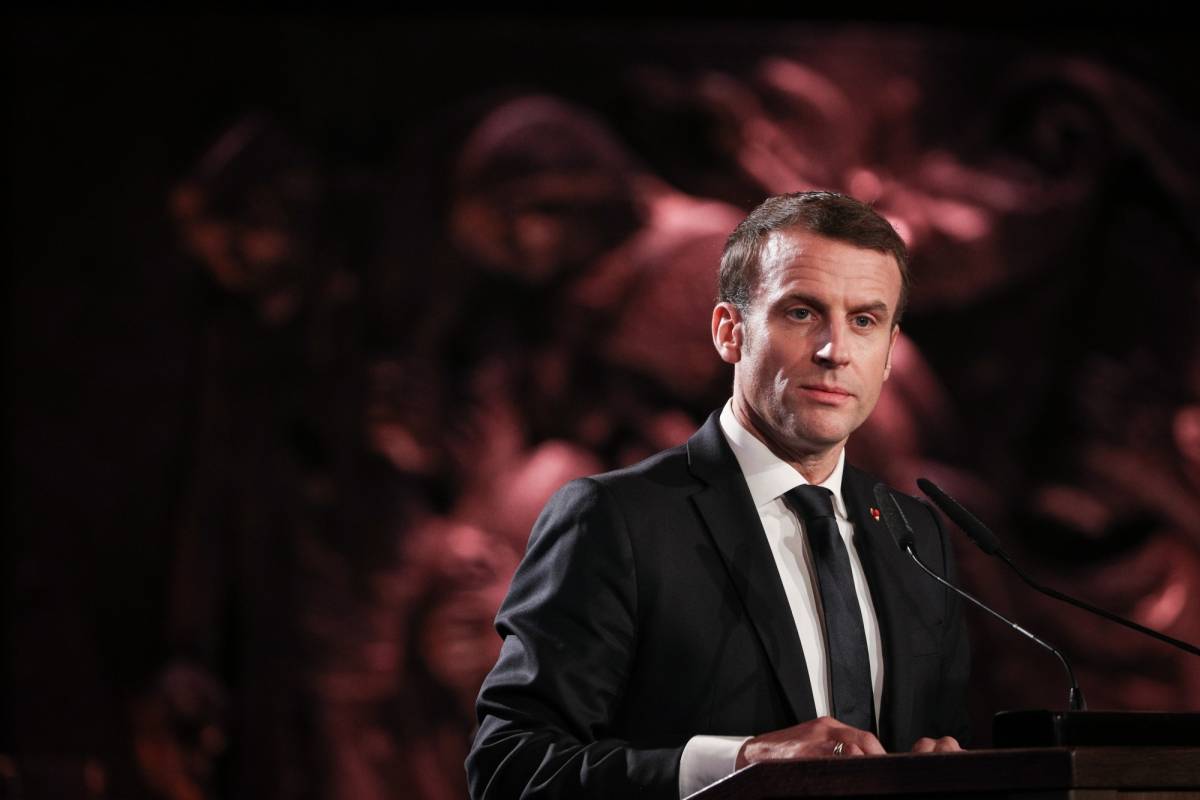The rare decision taken by French President Emmanuel Macron was made due to the “exceptional gravity” of the matter, foreign minister Jean-Yves Le Drian said, reports Asian Lite News
France plunged into an unprecedented diplomatic crisis with the United States and Australia after it recalled its ambassadors from both countries over a trilateral security deal which sank a French-designed submarine contract with Canberra.
The rare decision taken by French President Emmanuel Macron was made due to the “exceptional gravity” of the matter, foreign minister Jean-Yves Le Drian said in a statement.
On Thursday, Australia said it would scrap a $40-billion deal signed in 2016 for France’s Naval Group to build a fleet of conventional submarines and would instead build at least eight nuclear-powered submarines with U.S. and British technology after striking a trilateral security partnership.
The abandonment of the ocean-class submarine project that Australia and France had been working on since 2016 constituted “unacceptable behaviour among allies and partners”, Le Drian said.

“Their consequences affect the very concept we have of our alliances, our partnerships, and the importance of the Indo-Pacific for Europe,” he added.
On Wednesday, President Joe Biden announced the defence alliance which is widely seen as aimed at countering the rise of China.
The move infuriated France, which lost the contract worth $36.5 billion when signed in 2016.
Australia said on Saturday morning it regretted the recall, and that it valued the relationship with France and would keep engaging with Paris on other issues. “Australia understands France’s deep disappointment with our decision, which was taken in accordance with our clear and communicated national security interests,” a spokesperson for foreign affairs minister Marise Payne said in a statement.
Payne and defense minister Peter Dutton are currently in the United States for annual talks with their US counterparts and their first with President Joe Biden’s administration.
French Ambassador to Australia Jean-Pierre Thebault said Australia never mentioned that the project could be scrapped.
In an interview to Australian Broadcasting Corp., Thebault said, “We never were informed about any substantial changes. There were many opportunities and many channels. Never was such a change mentioned.”
Australian Prime Minister Scott Morrison, however, rejected French criticism and said he had raised the possibility in talks with the French president that Australia might scrap the Naval Group deal.
Morrison insisted he had told Macron in June that Australia had revised its thinking.
“I made it very clear, we had a lengthy dinner there in Paris, about our very significant concerns about the capabilities of conventional submarines to deal with the new strategic environment we’re faced with,” he said in an interview on Friday. “I made it very clear that this was a matter that Australia would need to make a decision on in our national interest.”

US, UK, Australia explored AUKUS pact at G7 meet
Details of the AUKUS deal between Australia, the US, and the UK that stole away the $66 billion contract Paris had signed with Canberra were agreed upon during the G7 summit in Cornwall this past June, The Telegraph reports.
The newspaper said on Sunday that French President Emmanuel Macron was unaware of preparations for the agreement.
Then-UK foreign secretary Dominic Raab (who is now the new justice secretary) was warned that such a deal could negatively affect relations with China and Paris, but the details of the agreement were nonetheless discussed at the G7 summit and all relevant AUKUS documents were classified as “top secret,” according to The Telegraph.
The Guardian said on Saturday that US talks on the issue went on for months in utmost secrecy and that during the G7 summit in Cornwall, Macron was given no hint that the Australians were about to scupper the deal.
Earlier this week, the US, Australia, and the UK announced a new trilateral AUKUS defence partnership. The new defensive pact forced Canberra to give up on a $66 billion contract with France to develop 12 state-of-the-art conventionally powered attack submarines.
The G7 includes Canada, France, Germany, Italy, Japan, the United Kingdom, and the United States. The summit in Cornwall, held on June 11-13, was also attended by the leaders of the European Union and several guest nations, such as South Korea, Australia, and South Africa.

Leave a Reply